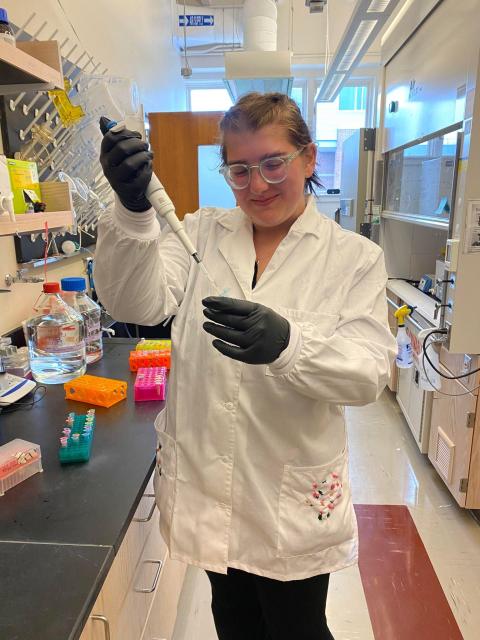
Madigan Jennison-Henderson ’25 is a biomedical sciences: medical microbiology major and chemistry minor from Dover, New Hampshire.
COLSA: Tell us about your research in as non-technical language as possible.
Madigan Jennison-Henderson: My research in the Oldenhuis (Nato) Lab focuses on purifying DNA from bacteria to generate a new source of double-stranded DNA (dsDNA) that is scalable and affordable, allowing it to be used as a generic polymer in materials research. As part of my project, I grow bacteria that contain extra pieces of circular DNA (plasmid DNA/pDNA). pDNA is separate from the genomic DNA in a cell, which allows us to have control of both the length and the genetic sequence of the DNA we produce. I do this using a benchtop bioreactor which can control growth conditions such as dissolved oxygen levels, pH, temperature, and more as the cells grow.
By providing them with the optimal environment for growth and pDNA production, I am able to make cells that are happy to grow plasmids in higher concentrations then would otherwise be possible. When the cells are done growing, I harvest them, crack open their membranes, and purify the plasmids from chromosomal DNA, RNA, organelles and other cellular debris using alkaline lysis and anion exchange chromatography. Once purified, the pDNA is used to make a new class of DNA hydrogels, where we study their mechanical properties using rheology.
COLSA: What challenge/issue does your research seek to address?
Madigan: NATO Lab works as a team to tackle the source, purification and chemistry obstacles to bulk production of DNA materials. We do this to answer fundamental questions associated with 3D polymer networks (both physically and chemically cross-linked).
One specific question we seek to answer is how manipulation of topological features in soft materials, such as double stranded DNA (dsDNA), control larger mechanical properties. To truly probe fundamental relationships in polymer networks, we need to have access to large quantities of the polymer used in our system(which is dsDNA for the NatoLab). Traditional methods used to make and purify DNA are not practical for applications such as bulk material, as they are wasteful and costly. My specific research works to combat this problem through the development of purification methods designed to drastically reduce the time, cost and waste associated with other sources of dsDNA production. This is what allows the generation of large quantities in a scalable and sustainable way. As a result, we can use nucleic acids, a largely understudied macromolecule, on a scale that is comparable to other biopolymers such as proteins and polysaccharides.
I truly feel like there is no way that is more enjoyable to learn then being surrounded by people who love what they do and are excited to welcome you into their research with open arms.
We are also working on developing new chemistries which allow functionalization of dsDNA to generate biomaterials. By doing this, we can produce networks composed of polymers that can be manipulated reliably and predictably with selective modifiers such as enzymes and small molecules. This degree of control over polymer chains is not possible with either synthetic or natural polymers, which only serves to highlight the significance of our work.
COLSA: What has your experience conducting undergraduate research been like so far?
Madigan: My experience in the Nato Lab has been incredible. It functionalizes a team-based model, which helps me feel like the work I am doing is meaningful not to myself, but to the research focus of the lab as a whole. It is a wonderful experience to see how the work I am doing directly relates to the work of every other person in the lab, even if we are focused on different experiments.
I truly feel like there is no way that is more enjoyable to learn then being surrounded by people who love what they do and are excited to welcome you into their research with open arms. Being in a space where it is so comfortable to ask questions, participate in group discussions, and offer my own ideas has been an experience that has renewed my love for science.
COLSA: What do you love most about UNH?
Madigan: I love the diversity in research experience available. There are so many opportunities on campus to help students participate in research, and even if the concentration of the lab is different from what you study, that typically isn't a deterring factor. As a R1 institution, there is something for everyone, even if it is unexpected. Being open-minded about what I researched allowed me to join the lab I am in, and it has opened so many new doors to my future in terms of networking, skills, and knowledge-building.
COLSA: Are there funding sources and/or collaborators we should acknowledge? If so, please list.
Madigan: My summer research is funded by NH Biomade, and NH BioMade is funded by NSF Award #IIA 1757371 administered by NH EPSCoR at UNH.